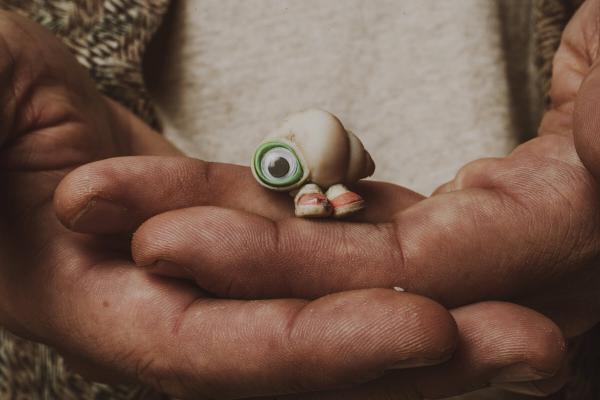I went to the theater alone, feeling small and bereft. At the urging of a friend, I went to see Marcel the Shell With Shoes On. I felt my smallness increase as the theater darkened. Then suddenly, there was Marcel, a one-inch-tall shell, blinking back at me. Marcel is soft-spoken, inquisitive, and wears pink shoes. He is alive, full of melancholy and persistent hope.
“It’s pretty much common knowledge that it takes at least 20 shells to have a community,” Marcel explains. Yet Marcel is alone, living in a quiet, human-sized house in the suburbs. After facing the loss of his entire community when his homeowners moved out, the only companion he has left is his Nana Connie, a loving and courageous shell with a failing memory, who was also left behind with Marcel. The home has since been converted into an Airbnb. Here, Marcel coexists with several guests, whose encounters never last long. “It’s not easy to feel so small,” he says.
Marcel made his first appearance in 2010 on YouTube, in the first of three stop-motion shorts created by comedian Jenny Slate, who voices Marcel, and filmmaker Dean Fleischer-Camp. Filmed entirely in the then-couple’s apartment, the videos feature Marcel’s cheeky observations about life and how tiny he is: “Guess what I wear as a hat. A lentil,” “guess what I do for adventure. I hang glide on a Dorito,” and “sometimes people say that my head is too big for my body and then I say, ‘compared to what?’” The first video has received nearly 33 million views. After the success of their YouTube shorts, Slate and Fleischer-Camp created two subsequent children’s books, and now, a feature-length film. Despite multiple offers from Hollywood studios and networks to feature Marcel in action films, Slate and Fleischer-Camp decided that the film should be produced by the independent film company A24. The creative duo believed that audiences would connect to a plot that centered relatable hardships.
For instance, how do we contend with the loss of community? We’ve had a lot of practice lately. The impact COVID-19 has had on the fracturing of communities is too great to measure. Through social isolation, financial instability, and death, many of us have been left feeling powerless to the waves of change in our lives.
Similarly, Marcel, without the assistance of his community, struggles to carry out daily tasks such as gathering water. But his exile has led him to ingenuity: He uses honey placed on the bottom of his shoes to scale walls, traverses from one side of the house to another by rolling inside the hollow of a tennis ball, and fishes for vegetables over a pot of steaming soup to feed himself and Nana Connie. Marcel is perpetually in survival mode, attempting to get by and holding onto the hope that his community will return someday.
Marcel’s life starts to shift when he meets Dean — an amateur filmmaker who is staying at the Airbnb while he sorts through his divorce. Dean is taken by Marcel’s tenacity and heart. To distract himself from his own separation, he decides to create a documentary about Marcel and Nana Connie’s unique, solitary existence.
The video goes viral after Dean shares it on YouTube. Marcel, understanding the power of numbers, asks Dean to make another video, this time as a campaign to help Marcel locate his family. Again, the video goes viral, but instead of receiving support from those who watch the video, Marcel witnesses apathetic fans take selfies outside of his home and infantilize his experiences.
Frustrated, Marcel tells Dean that this isn’t a community; it’s an audience. Marcel knows what community should look like because he had and lost one. Marcel understands that community should, just as Paul urges in Galatians 6:2, “bear one another’s burdens.” Community needs to be active, sacrificial, and loving. Each member fills an important role and participates as their full, authentic selves. Here, you don’t have to carry your burdens alone.
Marcel the Shell With Shoes On is an unexpectedly profound film — with moments of gut-wrenching truths followed by quick bursts of humor.
Eventually, Marcel learns how to rebuild community, not by pretending that he’s fearless, but by acknowledging his fears while moving into the unknown. When he speaks about what scares him, Marcel’s fears lose a bit of their power.
In one of the film’s most powerful scenes, Nana Connie, who is getting older and frailer, warns Marcel: “Don’t use me as an excuse not to live.” Through tears, Marcel asks, “But what if everything changes again?” “It will,” she responds.
Marcel the Shell With Shoes On delights in every tender feeling. It challenges us to slow down and take a good hard look at ourselves and at every small detail in our lives — from fears, to shoes, to the dust that drifts onto our coffee tables.
Toward the end of the film, Marcel plays “Amazing Grace” with a piece of curly pasta as his instrument. Here, Marcel is situated somewhere between his mourning for what is lost and his unabashed hope for what could be. And what an astonishing place to begin again. As the hymn goes, “I once was lost, but now I’m found.” Finding and forming community takes bravery, wonder, and creativity. “’Twas Grace that brought us safe thus far, / And Grace will lead us home.” Marcel wills us to find what is charming and sweet in this long journey home.
Got something to say about what you're reading? We value your feedback!







